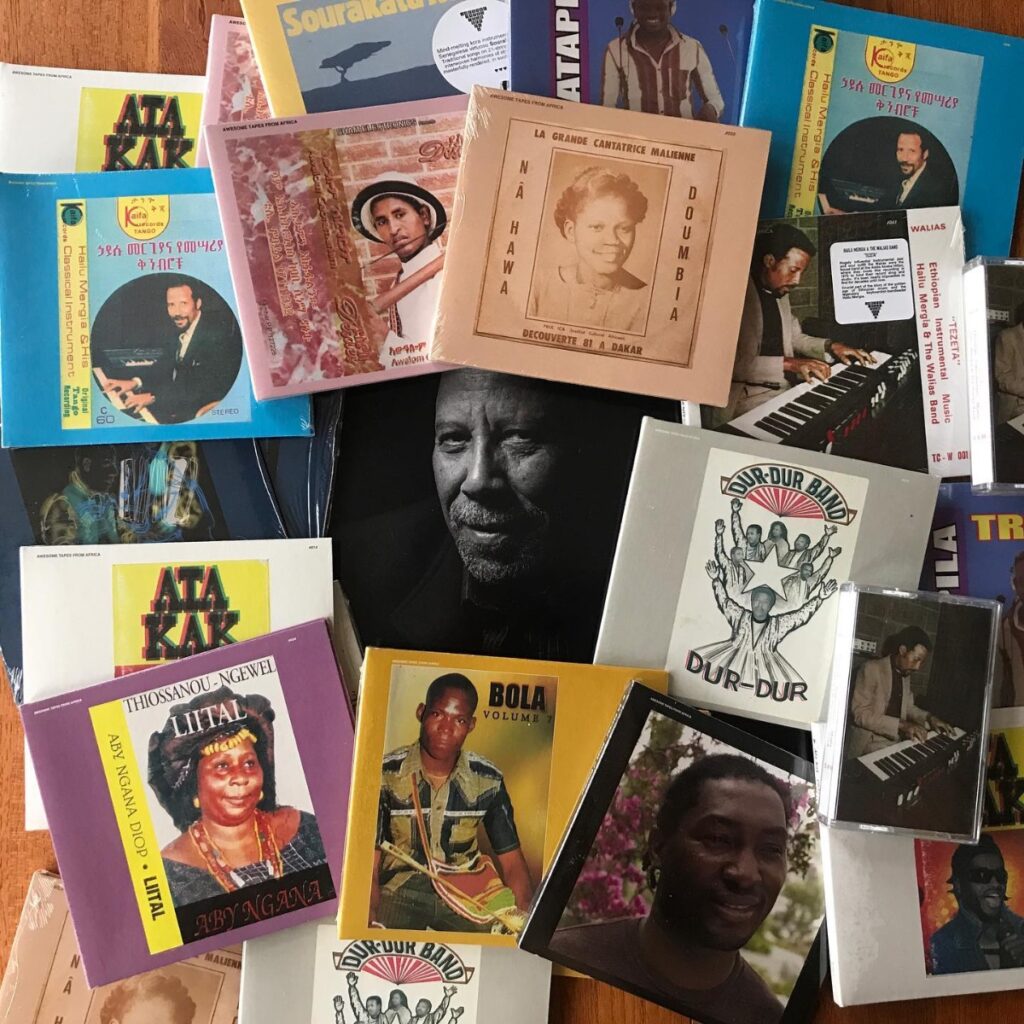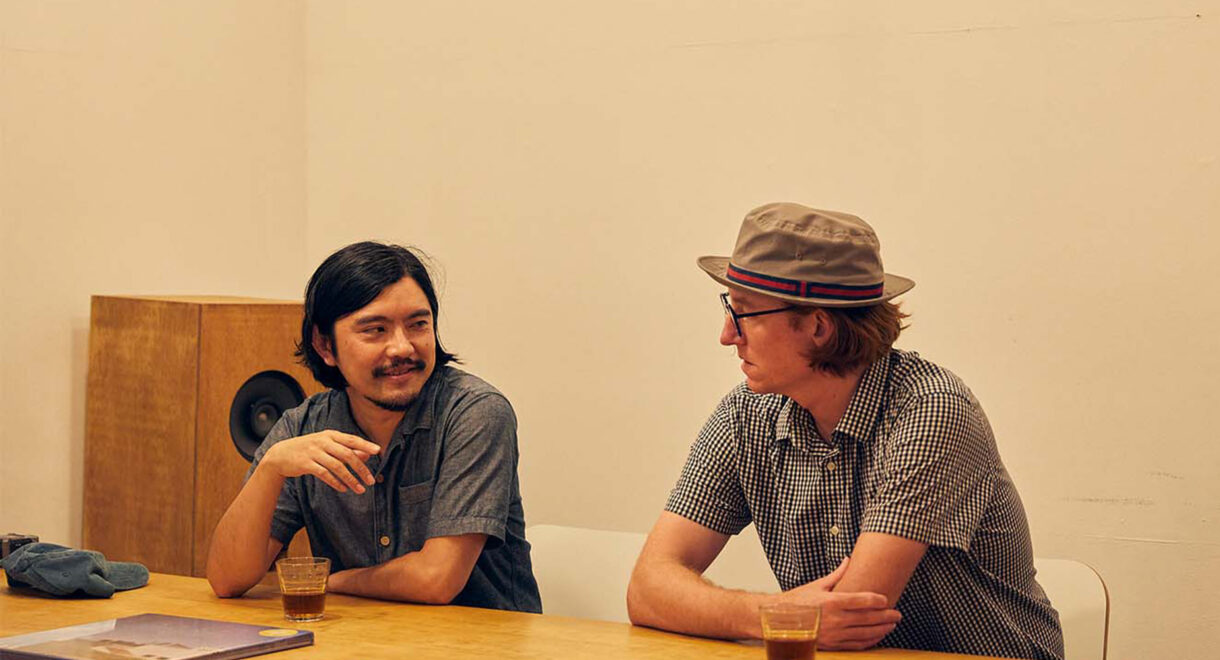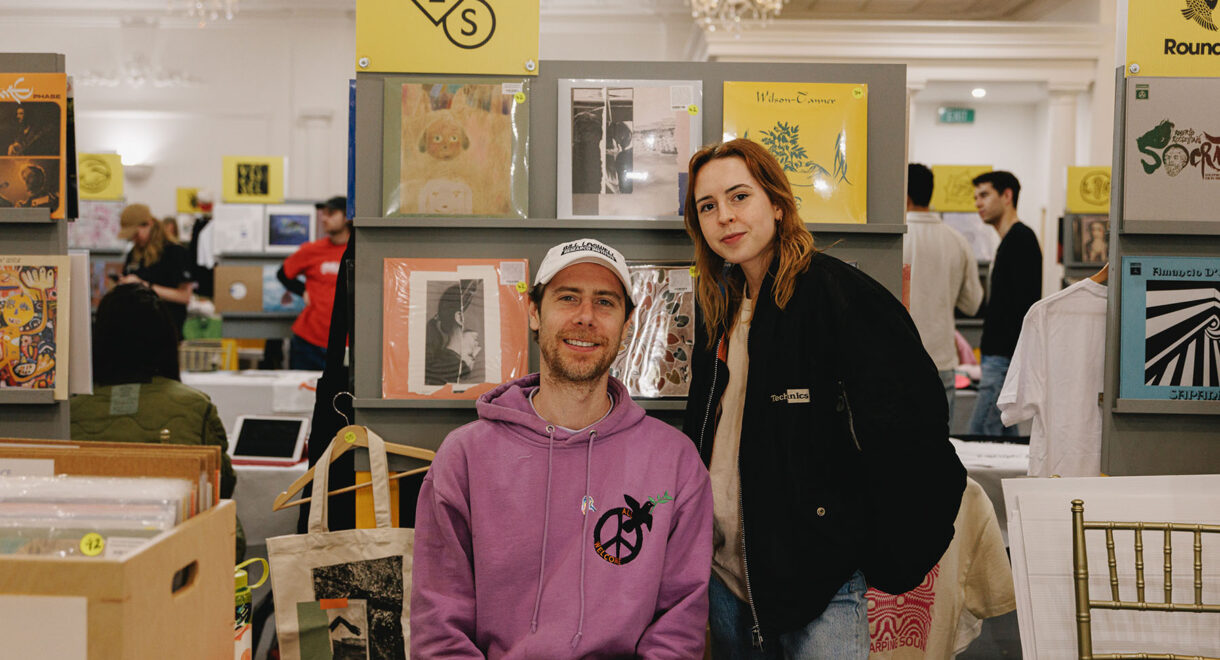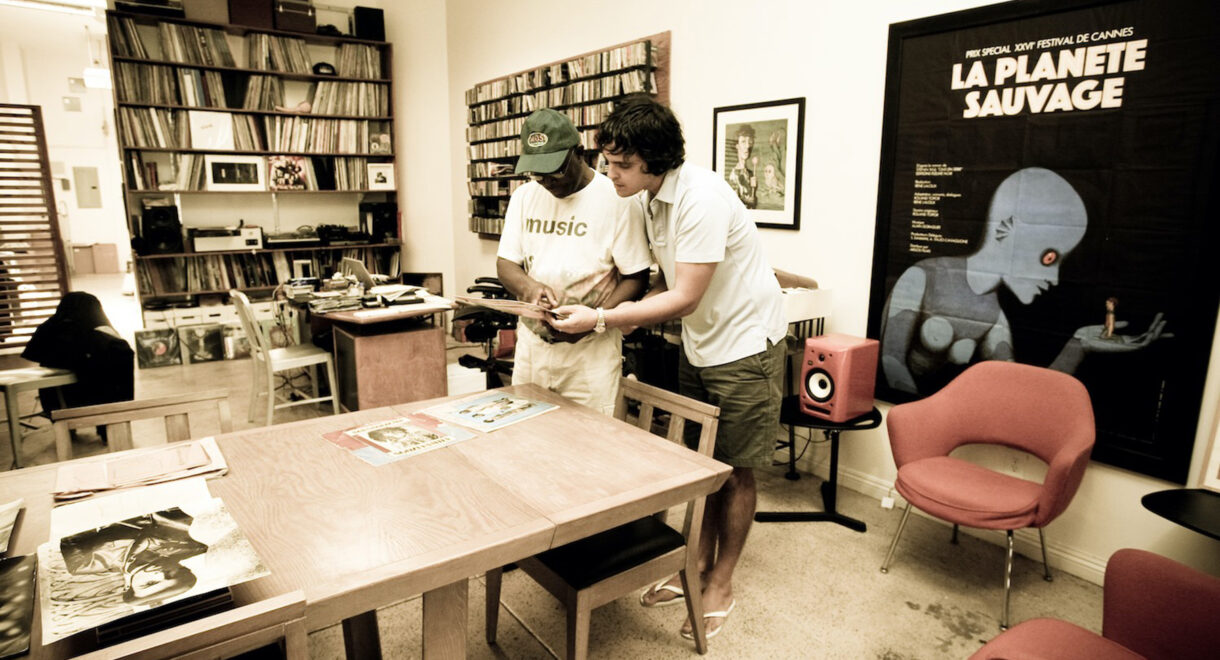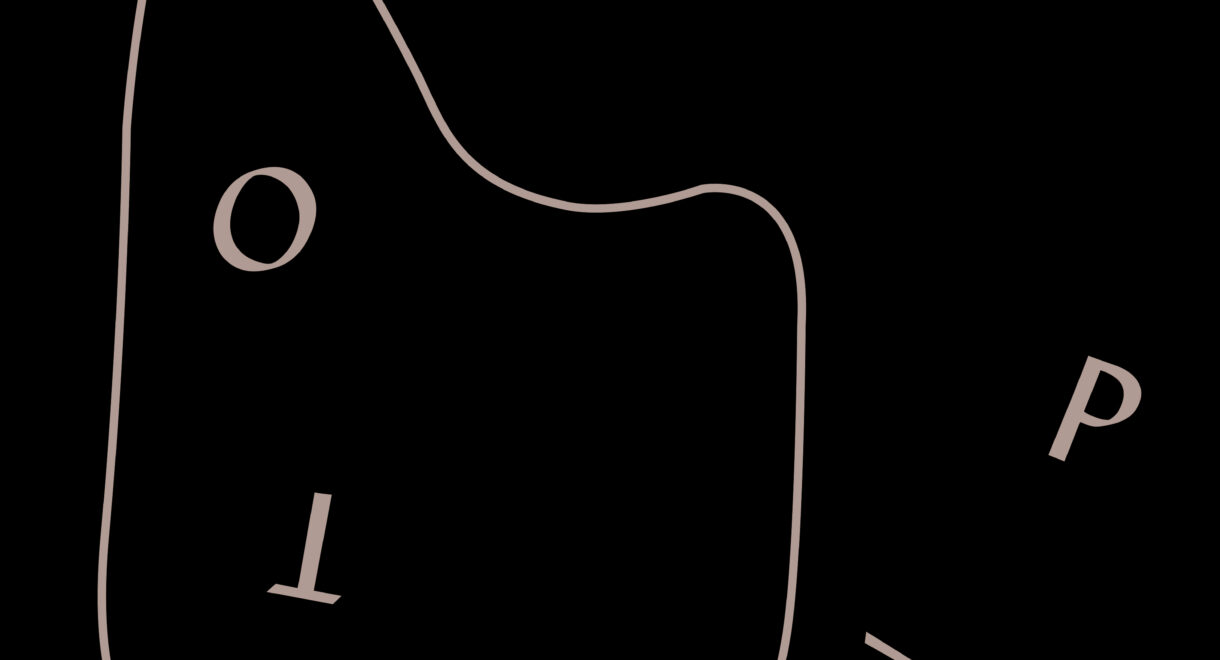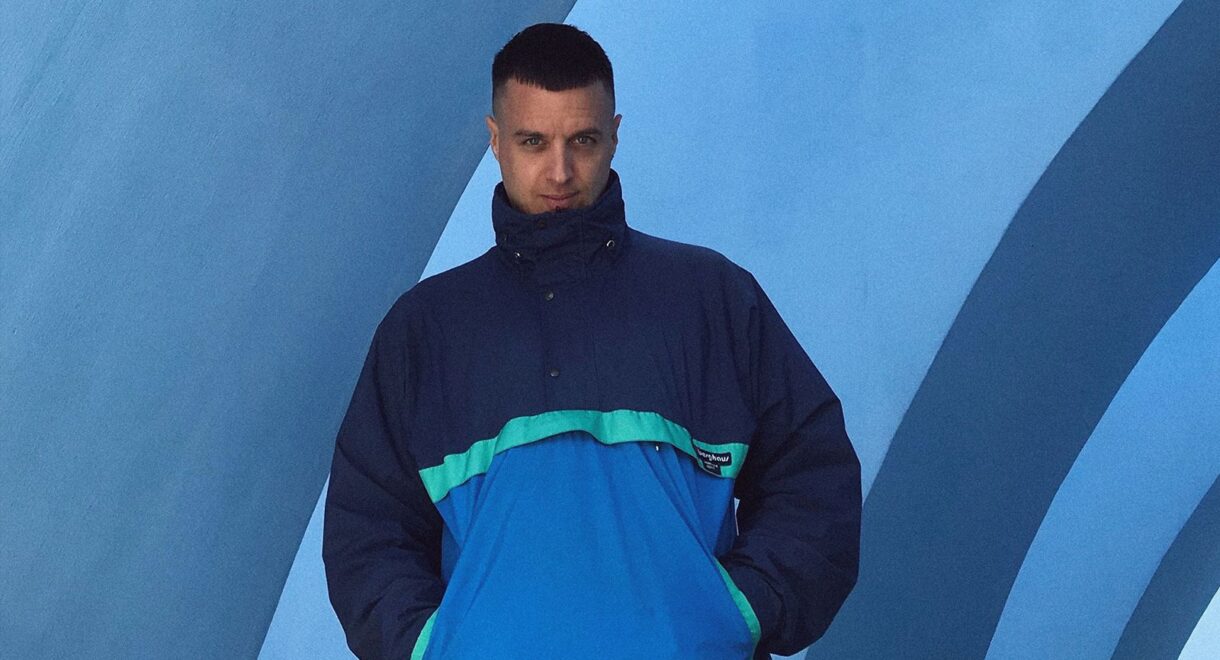A look into the young label behind the first-ever official reissues of Les Rallizes Dénudés and Hiroshi Yoshimura’s Surround. Temporal Drift is an independent record label launched by […]
Labels We Love: Awesome Tapes from Africa
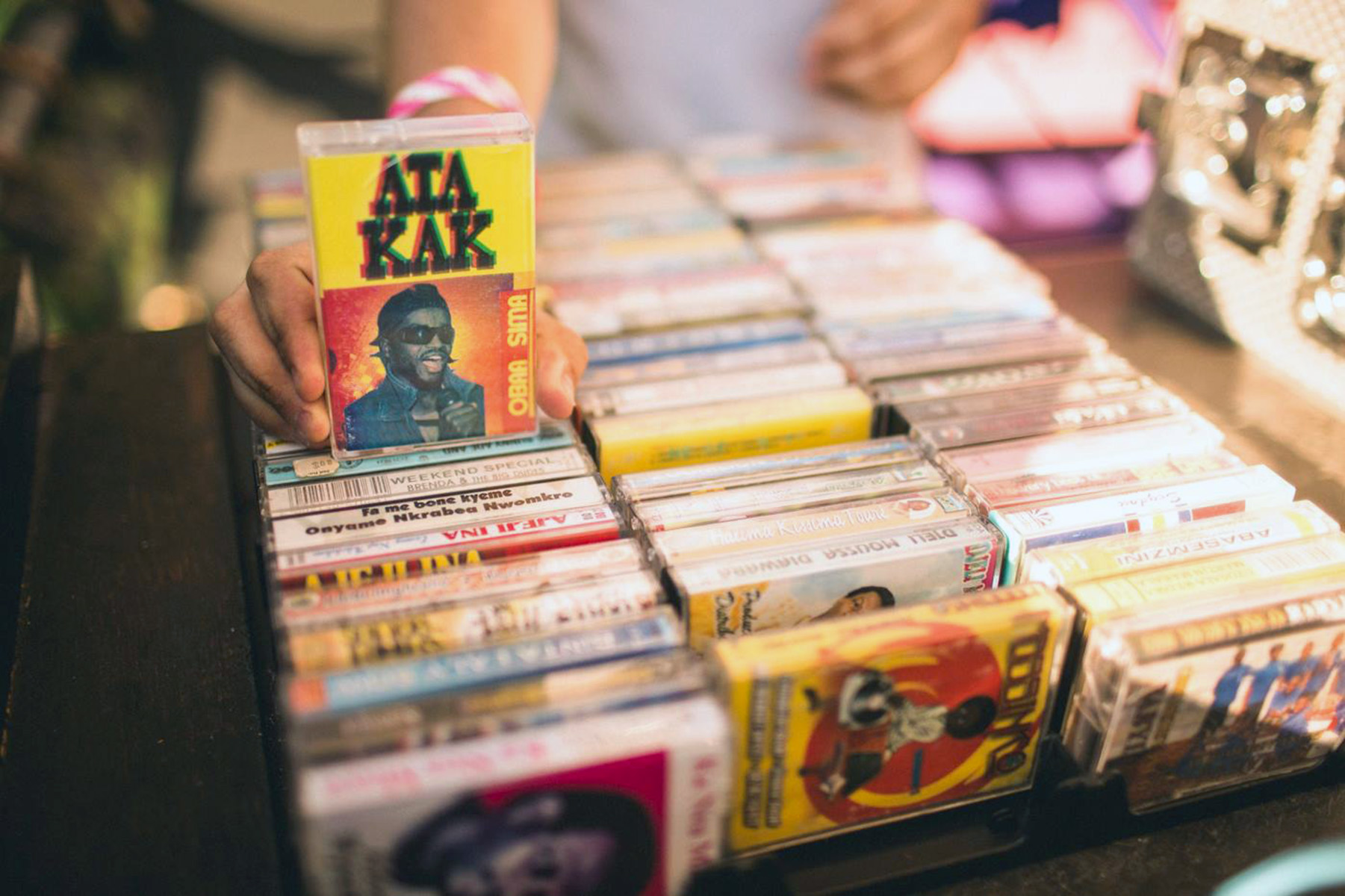
Join us 2-5pm at In Sheep’s Clothing NYC for a listening session dedicated to Awesome Tapes from Africa.
One of the great archival labels of our time, Awesome Tapes from Africa began as a humble mp3 blog way back in 2006 created by student, DJ, music lover Brian Shimkovitz. The site quickly developed a following and became known for sharing truly astounding music distributed mainly on cassette tapes found in street markets across the African continent. Each blog post included the music shared in its entirety along with scans of the tape artwork and short, but perfect descriptions of the sounds. Check this post from 2008 featuring NPP’s Yebo Ho Biom:
“Oh no it’s election time in America. Hillary asked her pals to vote for her campaign song earlier this year to amusing effect. Back in 2004, John A. Kufuor’s presidential re-election campaign in Ghana was bolstered(?) by this tape—with or without the express approval of the “gentle giant” himself (the cover misspells the man’s name).
Praise-laden sloganeering via song and rap here. Buried in the cassette notes it says vocals by Oheneba E.K. Nana Tufour Jnr. When in Ghana vote with thumb and ink (see tape cover).”
Since then, the blog-turned-label has gone on to put out 50+ releases, revitalizing the careers of a number of artists on the way, organizing international tours, and recently championing new sounds from younger artists like DJ Black Low, Teno Afrika, Native Soul, and SK Kakraba.
This afternoon 2-5pm at In Sheep’s Clothing NYC, we’ll be listening to some essential and favorite releases on the label including Ethiopian jazz legend Hailu Mergia & Dahlak Band’s lost late ’70s recordings Wede Harer Guzo, Ata Kak’s rap-house-highlife dance bomb Obaa Sima, Jess Sah Bi & Peter One’s ’80s Ivorian village songs Our Garden Needs Its Flowers, and more!
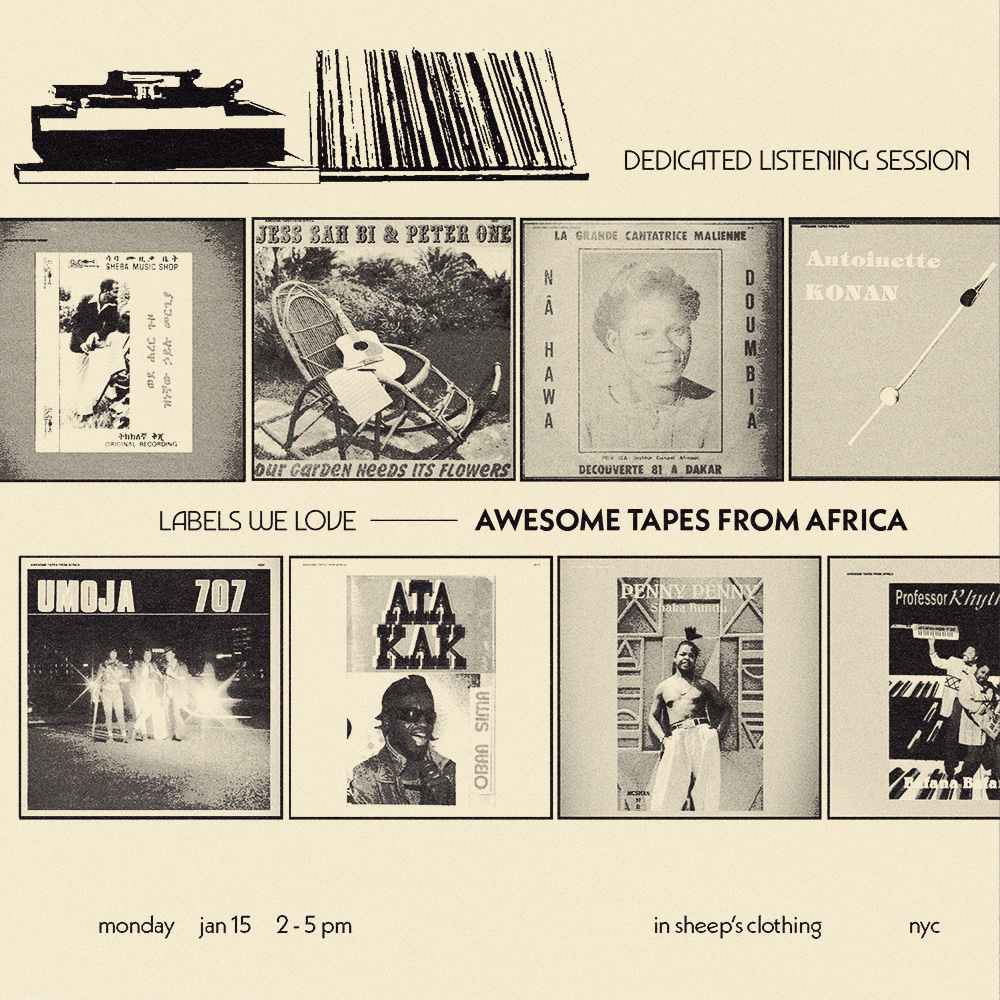
In anticipation of the listening session, we caught up with label founder Brian Shimkovitz over email to learn more about the label’s beginnings, the approach behind the label, emerging sounds from Africa, and more.
For additional reading, revisit our interview with Ethiopian jazz legend Hailu Mergia: https://insheepsclothinghifi.com/hailu-mergia-interview/
How did the label first get started?
Way way back in 2006 I started a blog to share all the tapes I found in West Africa while doing research there. I thought it would be fun to show people what music in urban centers over there actually sounds like. At the time, it felt like most awareness in the States about African music was quite general and ghettoized in the music industry and stores (see also: discussions of the term “world music”). Most of the music commercially available to us didn’t dive into the subcultural, less-easy-to-define and/or blink-and-you-miss-it music movements that exist by the thousands across every country on the continent. I wanted to make something immediate and simple that would let people hear the music without leaving my own fingerprints in terms of selecting songs or changing anything about the tape. So I posted complete tapes only and simply included the album art. After a few years I wanted to find a way to drive money into these artists’ pockets so I started a label with the help of Secretly Distribution. I had a background in music PR but I didn’t know what I was doing, I learned as I went. I was DJing tapes by then and spending a lot of time at parties, raves and bars talking about music and realizing that the types of African music I was into has a lot more fans than I thought. Maybe a label would work!

“I wanted to approach the label with a new paradigm that would hopefully create positive and more equal relationships between foreign label and local artists.”
Can you describe the ethos/approach behind the label?
My background in hanging in Ghana as a researcher for long periods boiled down to two major takeaways: there is obviously an immense amount of talent and interesting music in various parts of Africa, the deeper you look the more you find; and, the majority of the music and musicians don’t have access to the international marketplace that we take for granted in more developed countries. A DIY/punk approach to doing 50/50 deals with artists directly, letting them music speak for itself and not changing anything about the original recordings or their artwork seemed to be the most transparent way to go for a white guy from Chicago who wants to work with artist from the global south. I was then and continue to remain weary of the extremely lame history of exploitation by non-Africans in various music scenes over there throughout the 20th century. I wanted to approach the label with a new paradigm that would hopefully create positive and more equal relationships between foreign label and local artists, despite the obvious and considerable imbalance of the power dynamic. I view the label as releasing music other labels would not know how to or want to work with, that is crucial to telling a vivid story of a time and place and subculture. And since I only reissue complete albums—not disembodied compilations based on my own addled notions—any recording needs to be 100% banging. Nowadays we also release new music but it still falls under the same category of “if not us, then who?” due to the expense and complexity of marketing music in 2024.
For those new to the label, what are 5 Essential Releases to start with?
Hailu Mergia & Dahlak Band “Wede Harer Guzo” (ATFA021) — Our most popular release and an all-time favorite for moody, rainy nights at home.
Nahawa Doumbia “Vol 3” (ATFA001) — Our first release and a monumental acoustic masterpiece in my opinion.
Penny Penny “Shaka Bundu” (ATFA008) — Never not filling dance floors with every single track on this record, all anthems.
Teno Afrika “Amapiano Selections” (ATFA040) — Our first amapiano release and a runaway surprise hit of the pandemic for us.
Jess Sah Bi & Peter One “Our Garden Needs Its Flowers” (ATFA033) —Country/Americana from 1985 Ivory Coast that hits so many soothing and powerful notes. This album was massive across the continent and is one of the top songs on our YouTube channel.
Is there a particular record in the label’s discography that is of extra special importance to you? What’s the story behind that release?
I would say that the entire project started because of this tape by Ata Kak called Obaa Sima, which I still love to listen to all the time. Most people know the story but I was deeply inspired to start ATFA the blog because I had stumbled upon an inimitable recording made by an unknown singer based at the time in Canada. I searched for years, and years, until I was ale to meet him and legally license his recording for reissue. It’s been almost ten years Xin I started working with Yaw Atta-Owusu (perform known as Ata Kak) and it’s been an absolute dream come true, not that I would have had the moxy to dream like that.
He has played major festivals and stages across the world and his incredibly distinctive and fun recording has touched many thousands. Although he wasn’t well known in Ghana when the album came out in 1994, through Tik Tok we have learned that his songs were much much more popular locally than we knew. According to a lot of folks on social media who were around in the mid-90s you couldn’t go to a lively Ghana-style funeral or wedding without hearing one of these tracks on the dance floor. That’s new news to me but after playing a main stage at Glastonbury broadcast live by the BBC and selling thousands of records worldwide it’s good to know he had an impact back home initially. For more background on the tape check out the film we made about him and the detailed liner notes for the release.
The man has built an incredible following through his powerful concerts, positive attitude and thoughtful approach and I never get sick of hanging with him, a truly inspiring and brilliant person.
You’ve recently started releasing new music on the label, like amapiano producer DJ Black Low. What other new styles / sounds emerging from Africa should our visitors dive into?
I think amapiano is really fun and continuing to evolve, along with another South African style gqom—also vibrant and always changing. I also enjoy good old-fashioned soulful house music coming out of SA. There are artists doing new things with coupe decale in Côte d’Ivoire. Rap and trap continue to infiltrate every urban center across the continent in new and interesting ways, sometimes taking on local elements like in Senegal or Morocco. I’m still really enthusiastic about kuduro even though I do not have any on tape to play in my dj sets.
As a label owner, what are your personal favorite labels?
I’m an all-time fan of Folkways for their breadth, depth, ethics and consistency. I love ECM, but please don’t @ me about it. They have done a great job with sonic and visual branding and I love how they do both (their version of) jazz and classical music a lot of careful justice.
I listen to a lot of early music and I live in Germany so I am often grabbing records from a series called Das Alte Werk from the giant German label Telefunken. I’m a lifelong Grateful Dead tape collector and so perhaps my most favorite record label is the human fabric of multi-generational concert recording, trading and documentation networks that formed like mycelium around that band—if you could call that a label.
For African music, particularly on cassette, some of my favorite labels are Syliphone (Guinea), Teal, Music Team and Kalawa Jazmee (South Africa), Essibons & Addai Cutlass (Ghana), Mali K7 & Camara (Mali), Electra & Negarit (Ethiopia), Master Sound (Eritrea), Badmos (Côte d’Ivoire), Editions Kaluila (Congo/France), Decca West Africa (Nigeria) and Inter Diffusion System (Cameroon), TO NAME A FEW.
What is coming up next for the label?
We released three new recordings last year and two reissues, that was a lot for us and so Im slowing it down this year. We have a couple reissues of classic artists planned so far. I keep it spontaneous and loose with the release schedule but I never reveal info before it’s time so I have to keep this section kinda dull. But we do have some music that’s so fire and unknown to the majority of humans that it will likely spark some discussion when the time is right for the big reveal.
